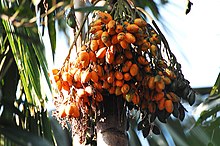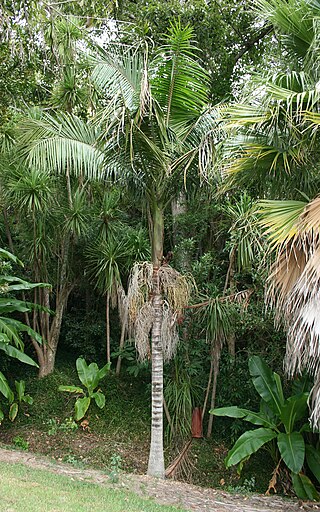
Archontophoenicinae is a botanical subtribe consisting of four genera of palms, namely Archontophoenix from Queensland and New South Wales and Actinokentia, Chambeyronia and Kentiopsis from New Caledonia. Phylogenetic relationships between the four genera are unresolved.

Rhopalostylidinae is a botanical subtribe consisting of two genera of palms from Australia and New Zealand, Hedyscepe and Rhopalostylis. These two genera were formerly included in Archontophoenicinae, to which they are morphologically similar, until a recent revision.

Corypheae is a tribe of palm trees in the subfamily Coryphoideae. In previous classifications, tribe Corypheae included four subtribes: Coryphinae, Livistoninae, Thrinacinae and Sabalinae, but recent phylogenetic studies have led to the genera within these subtribes being transferred into other tribes. Tribe Corypheae is now restricted to the genus Corypha alone.
John Dransfield is an honorary research fellow and former head of palm research at the Royal Botanic Gardens, Kew, United Kingdom, as well as being an authority on the phylogenetic classification of palms.
Areceae is a palm tree tribe in the family Arecaceae.

Dypsidinae is a subtribe of plants in the family Arecaceae.

Oncospermatinae is a palm tree subtribe in the tribe Areceae.
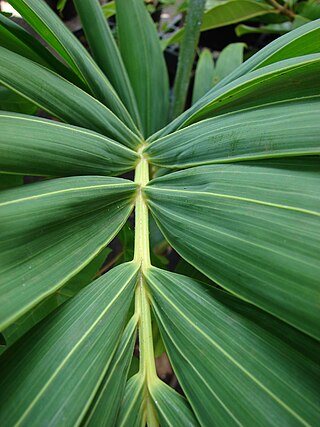
Ptychospermatinae is a palm tree subtribe in the tribe Areceae.

Caryoteae is a tribe in the palm family Arecaceae, distributed across Southeast Asia, from southern India and Sri Lanka east to Vanuatu and northernmost Queensland, Australia. It was long considered a member of subfamily Arecoideae on the basis of its inflorescences, which resemble those of tribe Iriarteeae, and the flowers arranged in triads, which are common across Arecoideae. However, phylogenetic studies based on DNA repeatedly link Caryoteae to subfamily Coryphoideae. Caryoteae do have leaves with induplicate folds, a feature found in most Coryphoid palms, but unlike most Coryphoideae, the leaves are pinnate or bipinnate (Caryota). Phoenix is the only other Coryphoid genus with induplicate, pinnate leaves.
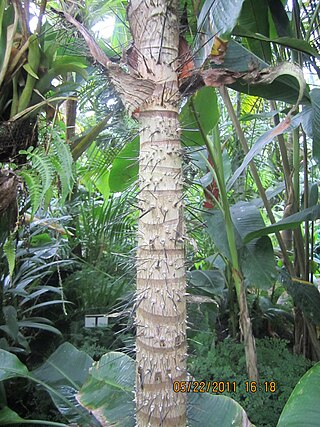
Iriarteeae is a palm tribe in the subfamily Arecoideae.
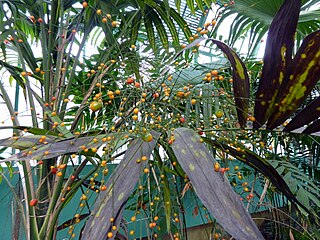
Chamaedoreeae is a palm tribe in the subfamily Arecoideae. It has five genera.

Chuniophoeniceae is a tribe of palms in subfamily Coryphoideae of plant family Arecaceae. The four genera within the tribe are morphologically dissimilar and do not have overlapping distributions. Three of the genera are monotypic, while the fourth genus (Chuniophoenix) has three species.
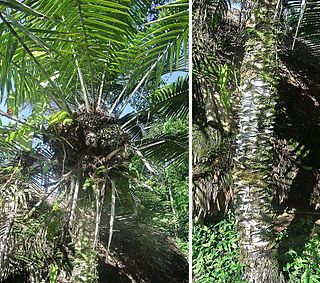
Phytelepheae is a tribe of plants in the subfamily Ceroxyloideae of the family Arecaceae.

Verschaffeltiinae is a subtribe of plants in the family Arecaceae endemic to the Seychelles.

Clinospermatinae is a subtribe of plants in the family Arecaceae.

Basseliniinae is a subtribe of plants in the family Arecaceae.

Carpoxylinae is a subtribe of plants in the family Arecaceae.
Pelagodoxeae is a tribe of plants in the family Arecaceae found in Oceania, namely in New Guinea and the Marquesas Islands. The tribe has two monotypic genera, which are:

Euterpeae is a tribe of Neotropical plants in the family Arecaceae. Genera in the tribe are:

Genera Palmarum is a botany reference book that gives a detailed overview of the systematic biology of the palm family (Arecaceae). The first edition of Genera Palmarum was published in 1987. The second edition was published in 2008, with a reprint published in 2014. Genera Palmarum is currently the most detailed monograph on palm taxonomy and systematics.
